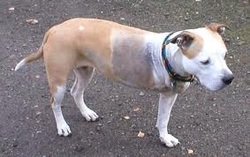Tips on Caring for Disabled Dogs
c

Dog disabilities could be a result of illness, physical injury or accidents. Just because your dog is disabled, it should not stop you from enjoying its company. As a dog owner, it is your responsibility to help the dog live a normal life and cope with the situation. Below are a few tips to keep your dog happy and healthy even with their disability.
Assist their movements
Dogs who suffer from mobility problems, such as hip dysplasia, arthritis, spinal disorders, DM in dogs, or other medical problems that affects their hind legs will need plenty of help moving around. To make things easier for you and the dog, you can buy a special leash that supports their torso and back legs. There are also other tools that assist in mobility problems, such as dog wheelchairs that can be strapped to their backs. If you are going to take the dog out to the vet, you will need to carry it into the car since it might have a hard time getting in. You can also use a small and improvised ramp that will help them walk into the car.
Watch their weight
Like humans, over weight dogs have a higher chance of getting stick compared to dogs that stay within their ideal weight. Exercise and a balanced diet are the only things you really need to worry about when it comes to your dog's weight. Make sure they get the right amount of exercise by taking them out for walks or jogs. You can also let them run around in an open area like you back yard, front lawn or the nearest park. Never over feed or underfeed your dogs. Use a good dog food mix or you can feed them meat that you prepared. Check with your vet about your dog's ideal weight and the best type of diet you can give it.
Regular visits to the doctor
Visiting the vet regularly helps you and your dog's doctor track the dog's condition and see if it's improving or not. By going to the vet, you can detect any problems and stop them before they develop even further. The vet can also advise you on medical procedures and other remedies that can help or cure your dog. They can also offer medical screening for some genetic illnesses like DM in dogs.
Talk to your dog
Taking to your dog is actually a form of therapy for the both of you. Massage and gently rub its fur and spend some time with it. Sometimes, human touch works better and is more calming and relaxing compared to any other type of medication.
Assist their movements
Dogs who suffer from mobility problems, such as hip dysplasia, arthritis, spinal disorders, DM in dogs, or other medical problems that affects their hind legs will need plenty of help moving around. To make things easier for you and the dog, you can buy a special leash that supports their torso and back legs. There are also other tools that assist in mobility problems, such as dog wheelchairs that can be strapped to their backs. If you are going to take the dog out to the vet, you will need to carry it into the car since it might have a hard time getting in. You can also use a small and improvised ramp that will help them walk into the car.
Watch their weight
Like humans, over weight dogs have a higher chance of getting stick compared to dogs that stay within their ideal weight. Exercise and a balanced diet are the only things you really need to worry about when it comes to your dog's weight. Make sure they get the right amount of exercise by taking them out for walks or jogs. You can also let them run around in an open area like you back yard, front lawn or the nearest park. Never over feed or underfeed your dogs. Use a good dog food mix or you can feed them meat that you prepared. Check with your vet about your dog's ideal weight and the best type of diet you can give it.
Regular visits to the doctor
Visiting the vet regularly helps you and your dog's doctor track the dog's condition and see if it's improving or not. By going to the vet, you can detect any problems and stop them before they develop even further. The vet can also advise you on medical procedures and other remedies that can help or cure your dog. They can also offer medical screening for some genetic illnesses like DM in dogs.
Talk to your dog
Taking to your dog is actually a form of therapy for the both of you. Massage and gently rub its fur and spend some time with it. Sometimes, human touch works better and is more calming and relaxing compared to any other type of medication.
This article is copyrighted and remains the property of the author. Individuals are welcome to print or copy same for their own use in furthering their knowledge of dogs. However, no reproductions or alterations/variations are allowed without the express written consent of the author.
